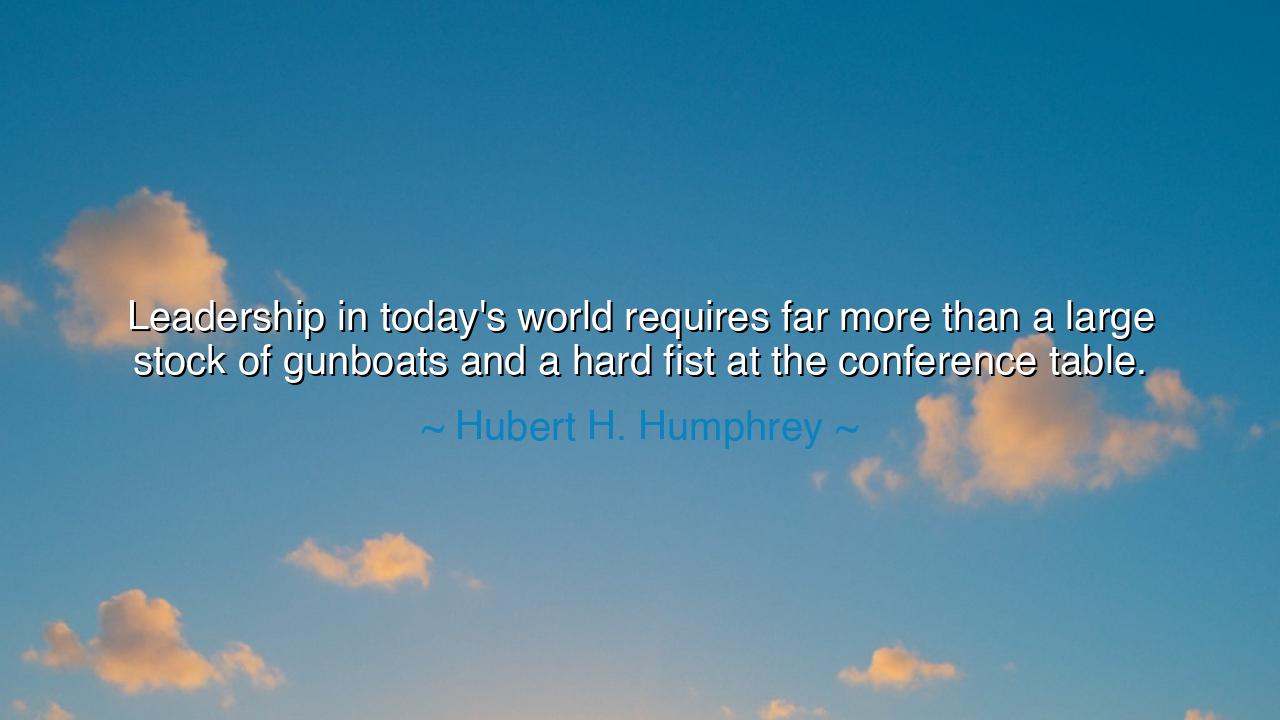
Leadership in today's world requires far more than a large stock
Leadership in today's world requires far more than a large stock of gunboats and a hard fist at the conference table.






When Hubert H. Humphrey declared, “Leadership in today’s world requires far more than a large stock of gunboats and a hard fist at the conference table,” he spoke as a prophet of peace in an age intoxicated by power. His words are not those of weakness, but of wisdom — the reminder that true leadership is not born from intimidation or the noise of arms, but from the strength of vision, compassion, and moral courage. Beneath this statement lies the eternal truth that the mightiest empires fall when they mistake fear for respect and coercion for unity.
The origin of this quote comes from the era of the Cold War, when the world trembled under the shadow of nuclear power and global competition. Humphrey, a man of conscience and conviction, saw the danger of relying on military might as the sole language of leadership. The “gunboats” he spoke of were symbols of dominance — relics of the imperial past — while the “hard fist at the conference table” represented the arrogance of diplomacy without empathy. In contrast, Humphrey envisioned a new kind of statesmanship: one built not on force, but on understanding, one that recognized that the destiny of nations is bound together, not divided by pride.
In the spirit of the ancients, Humphrey’s words echo the wisdom of King Solomon, who once wrote that “a soft answer turns away wrath, but a harsh word stirs up anger.” So too, in the arena of nations, the gentle strength of dialogue often outlives the brittle triumph of conquest. A sword can win a battle, but only wisdom and compassion can win an age. The greatest leaders — from Marcus Aurelius to Abraham Lincoln, from Mahatma Gandhi to Nelson Mandela — all understood this law of humanity: that the power to destroy is common, but the power to heal is divine.
Consider the story of Theodore Roosevelt, who once said, “Speak softly and carry a big stick.” Even he, a man of vigor and power, knew that the big stick was useless without the soft voice of diplomacy. It was this balance — of readiness and restraint, of courage and humility — that preserved peace more effectively than any fleet of ships. Humphrey’s insight goes further: in the modern world, even the “stick” has lost its virtue if it is wielded without conscience. In an age of global interdependence, where war can end civilization, moral leadership — the leadership of listening, reasoning, and uniting — is the only force that endures.
His words also speak beyond politics. In every age and every field, there are those who believe that strength comes from domination — the employer who rules by fear, the parent who demands obedience, the leader who mistakes silence for loyalty. But true leadership, as Humphrey teaches, lies not in coercion, but in inspiration. The wise leader does not demand submission; he earns respect. He does not command the world to move; he shows it why it must. His power flows not from fear, but from faith — the faith of others who follow him willingly because they see justice in his purpose.
This truth has guided civilizations since time began. The Roman Empire, built on conquest, collapsed under its own weight; but the teachings of philosophers and prophets outlived it. The British Empire, once ruling the seas with its gunboats, gave way to the power of ideas — democracy, science, education — which became its truest legacy. So too, in our time, the leaders who will be remembered are not those who shouted the loudest, but those who spoke with the voice of reason and hope amid the storms of chaos.
And so, the lesson endures: leadership is not domination, but direction. To lead is not to crush opponents, but to lift humanity higher. The modern world does not need more fists; it needs more hearts. Those who would guide others must learn the ancient art of strength without cruelty, courage without arrogance, and conviction without hatred. As Humphrey reminds us, in this age of weapons and machines, the greatest weapon of all remains the human spirit — unyielding in truth, and radiant in compassion.






AAdministratorAdministrator
Welcome, honored guests. Please leave a comment, we will respond soon